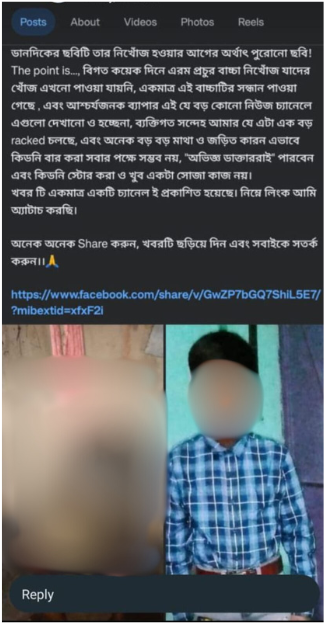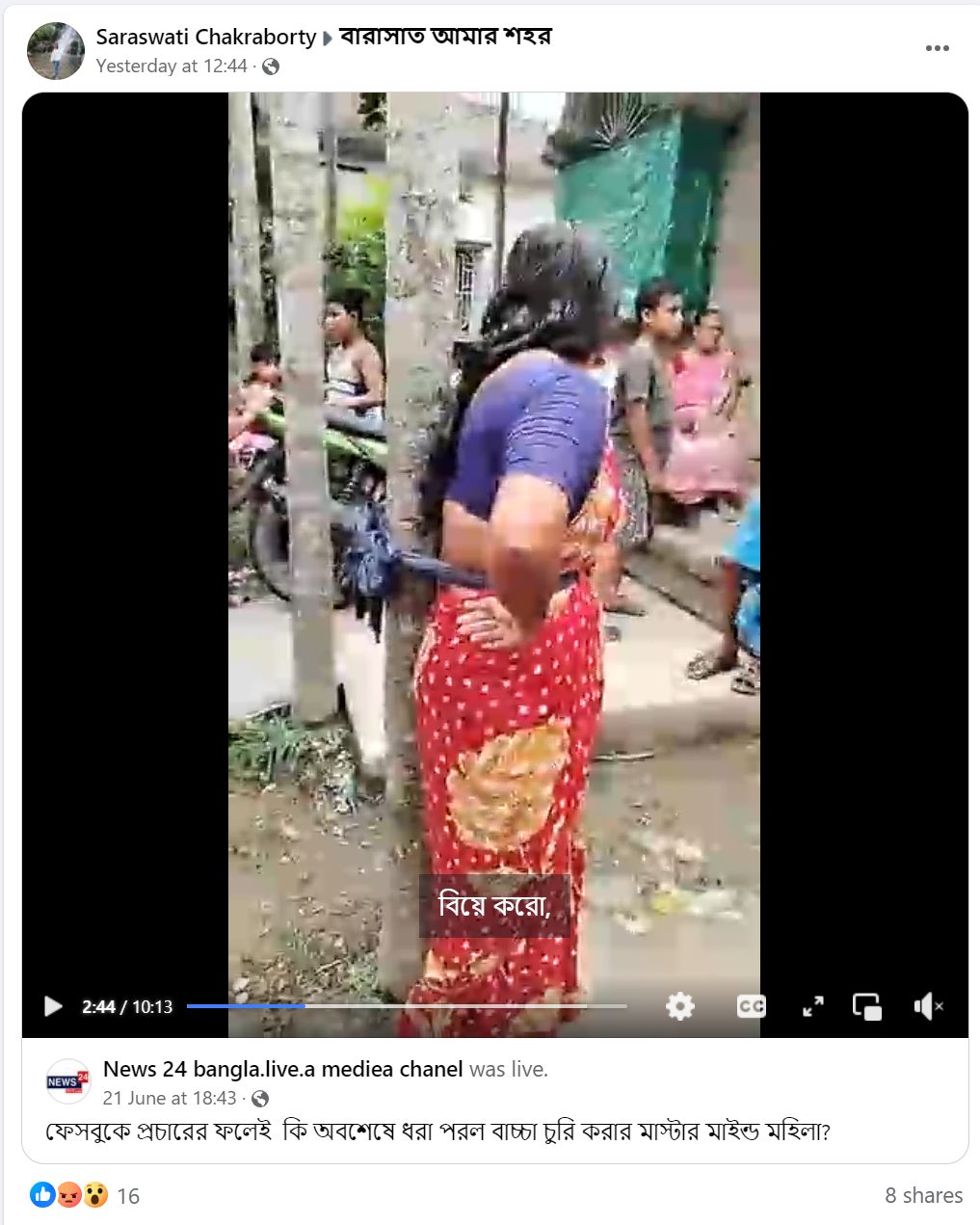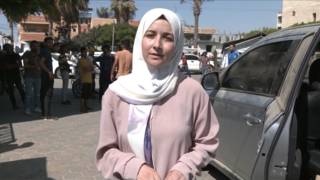This content originally appeared on Democracy Now! and was authored by Democracy Now!.
This post was originally published on Radio Free.
This content originally appeared on Democracy Now! and was authored by Democracy Now!.
This post was originally published on Radio Free.

On what would have been assassinated Congolese leader Patrice Lumumba’s 99th birthday, we speak with author and analyst Vijay Prashad, who has just published a lengthy article on Lumumba and the Democratic Republic of the Congo’s ongoing struggle for control over its own resources. Sunday marked the 64th anniversary of Lumumba’s historic speech marking his country’s independence from Belgium, in which he delivered a blistering critique of colonialism. Lumumba’s rise to become the first elected prime minister of Congo came after decades of brutal violence under Belgian rule and the extraction of vast wealth in rubber, ivory and other commodities from the country. Lumumba was assassinated soon after taking office in a plot involving the CIA and Belgium, leading to decades of dictatorship under Mobutu Sese Seko, wars, poverty and resource exploitation that continues to ravage the country to this day. “The issue of control over resources is fundamental,” says Prashad, director of the Tricontinental: Institute for Social Research. “The Congolese have never been able to put forward a national project around how to unite the people. … This has always been suborned by external intervention.”
This content originally appeared on Democracy Now! and was authored by Democracy Now!.
This post was originally published on Radio Free.
Chinese-language posts have circulated a claim that the United States issued a level 4 travel alert, the highest level, to its citizens traveling to China after four Americans were attacked there in June.
But the claim is false. The U.S. travel alert for China has remained at level 3, the second highest level, since April.
The claim was shared on X, formerly known as Twitter, on June 12.
“The United States issued a Level 4 travel warning for the assassination of four citizens in the Chinese Communist Party,” the claim reads in part.
The claim was shared alongside a screenshot of what appears to be a travel warning issued by the U.S. Department of State.

The claim began to circulate online after four American teachers were assaulted by a man wielding a knife at a park in the Chinese city of Jilin on June 10.
All of the teachers survived the incident and Chinese authorities took the assailant into custody.
U.S. officials expressed concern over the incident, while the Chinese Foreign Ministry commented that the attack “will not affect the normal people-to-people exchanges between China and the US.”
The same screenshot with a similar claim was also shared on X and Telegram.
But the claim is false.
U.S. travel advisory on China
The U.S. Department of State issues four levels of travel alerts to citizens, based on the varying levels of risk in different countries. These alerts range from level 1, advising to “exercise normal precautions,” to level 4, warning “do not travel.”
In April 2024, the U.S. travel advisory for China was updated to level 3, advising citizens to “reconsider travel.” This rating remains in effect.
The most recent revision of the U.S. travel advisory for China was on April 12, 2024, following the passage of new national security legislation in Hong Kong. Several English- and Chinese-language media outlets reported on this change at the time.
The advisory urges U.S. citizens to “reconsider travel” due to the potential for “arbitrary enforcement of local laws” and the “risk of wrongful detentions.”
Old alert
Keyword searches found a screenshot of the U.S. travel advisory shared in social media posts in fact taken from the old alert issued on Jan. 25, 2020.

The Chinese text seen in the screenshot shows that the alert was issued following the breakout of COVID-19 in the city of Wuhan and advised travelers not to enter Hubei province, of which Wuhan is capital.
Translated by Shen Ke. Edited by Shen Ke and Taejun Kang.
Asia Fact Check Lab (AFCL) was established to counter disinformation in today’s complex media environment. We publish fact-checks, media-watches and in-depth reports that aim to sharpen and deepen our readers’ understanding of current affairs and public issues. If you like our content, you can also follow us on Facebook, Instagram and X.
This content originally appeared on Radio Free Asia and was authored by By Zhuang Jing for Asia Fact Check Lab.
This post was originally published on Radio Free.
Chinese-language posts have circulated a claim that the United States issued a level 4 travel alert, the highest level, to its citizens traveling to China after four Americans were attacked there in June.
But the claim is false. The U.S. travel alert for China has remained at level 3, the second highest level, since April.
The claim was shared on X, formerly known as Twitter, on June 12.
“The United States issued a Level 4 travel warning for the assassination of four citizens in the Chinese Communist Party,” the claim reads in part.
The claim was shared alongside a screenshot of what appears to be a travel warning issued by the U.S. Department of State.

The claim began to circulate online after four American teachers were assaulted by a man wielding a knife at a park in the Chinese city of Jilin on June 10.
All of the teachers survived the incident and Chinese authorities took the assailant into custody.
U.S. officials expressed concern over the incident, while the Chinese Foreign Ministry commented that the attack “will not affect the normal people-to-people exchanges between China and the US.”
The same screenshot with a similar claim was also shared on X and Telegram.
But the claim is false.
U.S. travel advisory on China
The U.S. Department of State issues four levels of travel alerts to citizens, based on the varying levels of risk in different countries. These alerts range from level 1, advising to “exercise normal precautions,” to level 4, warning “do not travel.”
In April 2024, the U.S. travel advisory for China was updated to level 3, advising citizens to “reconsider travel.” This rating remains in effect.
The most recent revision of the U.S. travel advisory for China was on April 12, 2024, following the passage of new national security legislation in Hong Kong. Several English- and Chinese-language media outlets reported on this change at the time.
The advisory urges U.S. citizens to “reconsider travel” due to the potential for “arbitrary enforcement of local laws” and the “risk of wrongful detentions.”
Old alert
Keyword searches found a screenshot of the U.S. travel advisory shared in social media posts in fact taken from the old alert issued on Jan. 25, 2020.

The Chinese text seen in the screenshot shows that the alert was issued following the breakout of COVID-19 in the city of Wuhan and advised travelers not to enter Hubei province, of which Wuhan is capital.
Translated by Shen Ke. Edited by Shen Ke and Taejun Kang.
Asia Fact Check Lab (AFCL) was established to counter disinformation in today’s complex media environment. We publish fact-checks, media-watches and in-depth reports that aim to sharpen and deepen our readers’ understanding of current affairs and public issues. If you like our content, you can also follow us on Facebook, Instagram and X.
This content originally appeared on Radio Free Asia and was authored by By Zhuang Jing for Asia Fact Check Lab.
This post was originally published on Radio Free.
This content originally appeared on Radio Free Asia and was authored by Radio Free Asia.
This post was originally published on Radio Free.
This content originally appeared on Radio Free Asia and was authored by Radio Free Asia.
This post was originally published on Radio Free.
The Dalai Lama was discharged from a New York City hospital Saturday after undergoing successful knee replacement surgery, hospital staff said.
The Tibetan spiritual leader, who turns 89 on July 6, has experienced health problems for years. His knee issues required medical attention outside northern India where he has lived in exile for 65 years following a failed uprising against Chinese rule in Tibet.
After being discharged, he went to the Park Hyatt Hotel in Manhattan, where he is staying.
“He is expected to make a full recovery and was discharged Saturday morning, June 29th,” said Dr. David J. Mayman, chief of the adult reconstruction and joint replacement service at the Hospital for Special Surgery in New York.
“His Holiness’s personal medical team and office were in constant communication with the surgical and medical staff at HSS,” Mayman said. “We are grateful for their trust and assistance.”

The Nobel Prize winner enjoys strong support in the United States, especially among prominent lawmakers who have spoken out about human rights issues in Tibet, despite objections by China which views him as a separatist and bristles at his interactions with foreign officials.
Tibetans and well-wishers gathered outside the hospital and the Park Hyatt to greet His Holiness, holding khatas – Tibetan white scarves – and flowers, offering their blessings for his swift recovery.
“First of all, I am so happy to hear about the success of His Holiness’s surgery,” said Chemi Youdon, waiting outside the hotel to welcome the Dalai Lama with a bouquet in hand.
“Secondly, this is his visit to the United States after such a long time. And thirdly, though I had a glimpse of him at Teterboro Airport in New Jersey when he first arrived, as a Tibetan, you never get enough of his blessings.”
Pema Sonam, waiting outside the Park Hyatt in New York, said the surgery highlighted the importance of the Dalai Lama’s health. “It’s a blessing that His Holiness has visited the U.S., allowing us to receive his blessings after so many years. I want to thank the attending doctor and his team, staff, and everyone involved for doing such a wonderful job.”
No public engagements are planned for the immediate future, as His Holiness focuses on his health and well-being.
This content originally appeared on Radio Free Asia and was authored by By RFA Tibetan.
This post was originally published on Radio Free.
The alleged murder of an 11-year-old boy over a property dispute in the town of Barasat, about 25 km north of Kolkata, has fuelled completely unsubstantiated rumours of child kidnapping and organ trafficking on social media, resulting in widespread panic and violent vigilantism. At least five incidents of mob assault on innocent people have been reported in the last five days in areas adjoining Barasat in the North 24 Paragans district of West Bengal.
So far, 34 people have been arrested in connection with these cases, including four for false social media posts stoking rumours. “There has not been a single incident of child kidnapping in Barasat police district. All the claims viral on social media in this regard are false”, Barasat SP Pratiksha Jharkhariya told the press on June 19.
The rumours, however, keep spreading powered by Facebook posts. The SP told Alt News on Monday, June 24, that 55 such Facebook posts had been identified by police, of which 51 were taken down.
The decomposed body of an 11-year-old boy from Barasat’s Kajipara was found hanging inside a long-unused lavatory in a neighbour’s house on June 13, four days after he had gone missing. The preliminary autopsy report suggested that he had been strangled to death.
Barasat Police cracked the case in about a week and arrested the boy’s uncle, Enger Nabi, on June 20. According to police, Nabi confessed to killing the boy over a financial dispute with the latter’s father.
The accused had tried to mislead the cops several times. He had allegedly poured a red liquid on the walls of the neighbour’s house to give the impression that residents of the house had killed the boy. “A forensic team had collected samples from the walls of the neighbour’s house. It wasn’t human blood. He tried to mislead us several times. But his statements kept changing and we kept questioning him. He finally broke down and told us that he had killed the boy as an act of revenge,” Jharkhariya told The Telegraph.
The successful investigation, however, brought little relief for the cops as rumours of child kidnappers and organ traffickers on the prowl had already spread like wildfire.
According to SP Jharkhariya. the rumours were begun by Nabi himself when the boy had gone missing. He works as a muezzin in a local mosque and has considerable sway over the locals. On June 12, a day before the boy’s body was found, he told them that a woman child-lifter had been in the area. He also made an announcement on this using the mosque’s public address system and urged people to protest against child kidnappers.
Alt News spoke to a primary school teacher in Barasat who said that the rumours had begun transmitting orally but before long, someone made a Facebook post on this.
One post led to many and the social media rumour attained a life of its own. People also started forwarding WhatsApp texts warning each other against child lifters on the prowl.
After the child’s body was found, it added fuel to the fire. A disturbing image of the decomposed corpse started circulating. The school teacher said he had received a collage of two images on WhatsApp — the child’s photo and that of the body — with an appeal to share it as much as possible. “It was so graphic, I deleted it immediately,” he added.
Alt News accessed one such Facebook post which is now deleted. It contained a collage of photos of the 11-year-old boy and his decomposed body recovered by police. The post talked about the involvement of an organ trafficking racket in the Kajipara incident.

The post said: “The image on the right had side is taken before he went missing. The point is… Several children have gone missing in the last few days and they remain untraced. Only this kid has been found. Surprisingly, the big news channels are not showing this. I personally suspect that there is a big racket (mis-spelt in Bengali as racked) behind this, some big shots are involved because removing the kidney is not as easy task. Only experienced doctors can do that. Storing a kidney is not an easy task either…”
There are several schools in the 1 km radius of Kajipara. Once rumours spread to the WhatsApp groups of the parents of young students, they stopped sending their children to school. Triggered by the rumours, a woman was beaten up by locals in Chakdah, about 40km away, on June 10, on the suspicion of being a child-lifter. Visuals of the incident went viral on Facebook, some of which are still live.
A local news outlet named News 24 Bangla Live did a report on this describing the woman as the mastermind of the child kidnapping gang. Several users shared it on community Facebook pages.

On being informed about the incident, Barasat police officers went to Chakdah. The SP told Alt News, “The woman is a resident of Chakdah. We traced her whereabouts. She begs from door to door. We did a thorough check and found that she was not involved in any wrongdoing. She had no antecedent or criminal record.”
Trying to dispel the rumours, Barasat Police put out a video with SDPO Vidyagar Ajinkya Anant stating that the post-mortem surgeon had confirmed that no organ was missing from the child’s body and organ trafficking had nothing to do with the child’s ‘killing’.
Social media rumors allege a woman is involved in child and organ trafficking in Barasat. The medical officer confirmed after a child’s post-mortem that it’s not organ trafficking. Please don’t spread these false news.
#FakeNewsAlert #BarasatPoliceDistrict #WestBanegalPolice4U pic.twitter.com/awKwRMomFL— Barasat District Police (@BarasatPolice) June 17, 2024
The video was also shared on Facebook. Police also shared a notice on WhatsApp and other social media platforms.

However, visuals of the incident went viral on Facebook with the false claim that the woman had kidnapped five children. Below are a few screenshots:
Click to view slideshow.The user, Adhara Purkayastha, is an actor-influencer with a large following. She later shared another post apologizing for her earlier post and acknowledging that the news of child theft was fake.
All of the above posts carried the same image which contained the name Injamul Haque. Police told Alt News that Haque was the first person who shared posts regarding child kidnapping and organ trafficking on social media.
We traced his X handle (@InjamulOfficial) where most of his posts contained the same name art as the one in the Facebook post. On X, Haque mostly shared news updates related to Bengal and the Trinamool Congress. He also attacked the BJP on various issues.
Click to view slideshow.His Facebook page has either been deleted or made private.

In a rare move, police arrested four persons in connection with false social media posts fueling rumours about child kidnapping. They were identified as Pritam Mistry, Abdul Karim Khan, Payel Talukdar and Sheikh Mijanur Rehman.
Barasat Additional SP Sparsha Nialngi told Alt News that in the suo motu case that was initially registered, they had been charged under IPC 505 and 506. However, while interrogating the people arrested for mob assault, it came to light that these four were names came up as instigators of the violence. “Their names have been added to the case related to the assaults,” she said.
“As administrators of Facebook pages, or as individual users, they were posting stuff, particularly videos, and spreading rumours that a gang of child kidnappers was on the prowl in Barasat. When we commented under those posts from the official handle, they took down our comments to ensure that the rumours did not stop,” Jharkhariya told Alt News.
Asked why there had been no action against Injamul Haque, Addl. SP Nilangi said, “Injamul Haque is not a resident of Barasat. He’s from Barrackpore. When we contacted him and informed him that it’s fake news, he deleted it. This was on June 18 when no assault incident had occurred (other than the one he posted aboout). He deleted it on the 18th itself. On the 19th, when two incidents of happened, we noticed some social media groups or pages related to Barasat posted the same fake news. When we tried to contact them and asked to take down posts, they did not take them down. Besides, since they’re from Barasat, local people saw their posts and reacted by assaulting others.”
Several incidents of mob assault on innocent people based on rumours of child kidnapping were reported in a span of five days.
On June 19, two incidents were reported in Barasat. In Mollapara, a man was thrashed by locals.
On the same day, a man and a woman were assaulted near the Central Modern School while boarding an auto-rickshaw. When police intervened, the mob ran riot and damaged police vehicles. The two victims were hospitalized.
Local councilor Sameer Talukder told Anandabazaar Patrika, “There is no basis to the rumours. Poeple are being beaten up just on suspicion. Two persons were severely badly beaten up till they were bleeding profusely. Some social media users are making unverified news about child kidnapping viral. Police are taking action against them. They are spreading the panic.”
On June 21, a woman named Rajani Khatun was assaulted in Ashok Nagar. An SI of police got injured in the clash when police tried to rescue her from the mob. On the following day, a man named Nazir Hussain was beaten up at an Eid fair in Mohanpur under Ranaghat PS area.
On the 24th, another incident was reported from Thakurpalli, Bangaon. Locals thrashed a vagabond on the suspicion of child kidnapping. He was rescued by police and admitted to the sub-divisional hospital.
“These assaults were the direct outcome of baseless social media posts. We traced 55 such posts and tried to reach out to the users one by one. Most of these are now deleted. Some of these were posted on coummunity pages like ‘Amar Sahar Barasat’ and ‘Barasat Online’ with 80 to 90,000 followers. We found that people from Barasat living abroad had also shared them without trying to verify their authenticity,” Jharkhariya told Alt News.
“Wherever an unknown face is seen, if he/she looks suspicious, people are tagging him as a child-lifter. In most cases, these people are vagabonds, drug addicts and beggars. In one instance, the person was mentally unstable. They were all beaten up. The violent vigilantism has reached a monstrous proportion,” she added.
The IPS officer said she was stunned by the propensity of people to turn violent. “As if, they did it for fun. It is an eye-opener for us as law enforcers. In a Dattapukur incident, everyone knew the victim as a vagabond living near the rail station for six to seven years. Still she was attacked. The criminality was always there inside. Once the rumours spread, it found an avenue to erupt.”
The post Child-kidnapping rumours trigger panic in Bengal towns after missing 11-year-old boy found dead appeared first on Alt News.
This content originally appeared on Alt News and was authored by Indradeep Bhattacharyya.
This post was originally published on Radio Free.
This content originally appeared on Democracy Now! and was authored by Democracy Now!.
This post was originally published on Radio Free.
This content originally appeared on Democracy Now! and was authored by Democracy Now!.
This post was originally published on Radio Free.

Abortion rights were a key focus of Thursday’s CNN debate between President Joe Biden and former President Donald Trump, the first to be held since the Supreme Court overturned Roe v. Wade in 2022. Trump took credit for nominating the conservative justices who helped overturn the law, and falsely claimed that Democrats support abortions “even after birth.” “We have no examples of that whatsoever,” says Michele Goodwin, professor of constitutional law and global health policy at Georgetown University. “There is no such thing as abortion after birth.” Goodwin says that while “Americans support reproductive freedom,” Biden’s messaging was weak in the debate.
This content originally appeared on Democracy Now! and was authored by Democracy Now!.
This post was originally published on Radio Free.

The first 2024 presidential debate between President Biden and former President Trump was held on Thursday night. It marked the first time a sitting president debated a former one. It also marked the two oldest candidates ever to run for president, with a combined age of 159. The 90-minute discussion hosted by CNN was more of an incoherent debacle than any substantive debate. Biden was halting and disjointed. He was hard to hear, muffled his lines and often appeared to lose his train of thought. Meanwhile, Trump repeatedly lied — his false claims not challenged by CNN moderators Jake Tapper and Dana Bash. “Joe Biden really failed to rise to this moment,” says Chris Lehmann, D.C. bureau chief for The Nation. “I expected nothing great, but it was so much worse.”
We also speak with Norman Solomon, executive director of the Institute for Public Accuracy and the co-founder of RootsAction.org, which sponsors the “Step Aside Joe!” campaign. He says Biden’s performance in the debate showed “he is clearly impaired” and unable to defeat Trump, which is “a gift to the extreme right wing.”
This content originally appeared on Democracy Now! and was authored by Democracy Now!.
This post was originally published on Radio Free.
This content originally appeared on Radio Free Asia and was authored by Radio Free Asia.
This post was originally published on Radio Free.
This content originally appeared on Radio Free Asia and was authored by Radio Free Asia.
This post was originally published on Radio Free.
This content originally appeared on Radio Free Asia and was authored by Radio Free Asia.
This post was originally published on Radio Free.
This content originally appeared on Democracy Now! and was authored by Democracy Now!.
This post was originally published on Radio Free.
Dakar, June 27, 2024 — Malian authorities should urgently investigate the disappearance of journalist Yeri Bocoum and account for his whereabouts, the Committee to Protect Journalists said Thursday.
Bocoum, director of the Facebook news page YBC-Communication, was last seen by his family outside his home in Kati, a district in the western region of Koulikoro, on the afternoon of June 8, according to a statement by his outlet and a person familiar with the case who spoke to CPJ on the condition of anonymity, citing security concerns. That person, who has spoken to the journalist’s family, told CPJ that Bocoum’s disappearance had been reported to the local police and gendarmerie, and the family has not received any updates as of June 27.
The day before Bocoum disappeared, he covered a banned demonstration by the opposition political group “Synergie pour le Mali” in Bamako, the capital. That evening, the journalist posted on the outlet’s Facebook page that “malicious individuals” riding two motorcycles had tried to “intercept” him while he was going home.
“The disappearance of Malian journalist Yéri Bocoum is alarming, raises serious concerns for his well-being, and sends a chilling message to the Malian media community,” said CPJ Africa Program Coordinator Muthoki Mumo, in Nairobi. “It is imperative that Malian authorities do everything necessary to find Bocoum, ensure that he returns home unharmed, and is able to safely resume his work.”
Regional authorities banned the June 7 demonstration, citing an earlier April 10 directive by Mali’s transitional government, which took power following a 2021 military coup. The directive outlawed all political party activity after several opposition parties called for presidential elections.
On April 11, the country’s media regulator High Authority for Communication (HAC) ordered journalists to stop covering political activities.
HAC President Gaoussou Coulibaly told CPJ in April 2024 that the HAC would investigate violations of the directive and that those found in contravention would face sanctions, including the closure of their media outlets. Coulibaly told CPJ in June that Bocoum’s work did not fall within HAC’s remit as he was not affiliated with a media outlet approved by the regulator.
In a June 13 report, the French public broadcaster Radio France Internationale cited a “Malian security source” and said Bocoum was being held by Malian state security services, which operate under the direct authority of the President. CPJ could not independently verify the RFI report.
CPJ’s calls and messages to Baba Cissé, head of the Malian presidency’s communications unit, and the national gendarmerie’s publicly listed number were unanswered. CPJ’s call to the publicly listed number for the Malian national police was answered by a person who declined to give his name but said to ask the family to contact the Kati police station to find out the status of the investigation.
This content originally appeared on Committee to Protect Journalists and was authored by Committee to Protect Journalists.
This post was originally published on Radio Free.
This content originally appeared on Democracy Now! and was authored by Democracy Now!.
This post was originally published on Radio Free.

We look at the targeting of journalists in Gaza with journalist Shrouq Aila, who joins us from Deir al-Balah in central Gaza. Aila’s husband Roshdi Sarraj, a fellow journalist and co-founder of the production company Ain Media, was killed in an Israeli airstrike on their home in October. Aila recounts how Sarraj’s shielding of her and her 1-year-old daughter saved their lives. “Everything went into dust, in just a second,” she says. As she mourned, Aila continued her work as a journalist and took over Sarraj’s place at Ain Media, saying her commitment as a journalist means a “duty of documenting the reality of the ground,” no matter what.
This content originally appeared on Democracy Now! and was authored by Democracy Now!.
This post was originally published on Radio Free.
This content originally appeared on Democracy Now! and was authored by Democracy Now!.
This post was originally published on Radio Free.
This content originally appeared on Democracy Now! and was authored by Democracy Now!.
This post was originally published on Radio Free.

We speak with Australian Senator Peter Whish-Wilson, a prominent supporter of WikiLeaks founder Julian Assange, who says the publisher’s case is “a big deal” in the country that cut across political divisions. “It’s taken a really big campaign, a really big grassroots campaign by thousands of people in Australia — indeed, millions of people around the world — to bring this to the attention of politicians.” Assange landed in Australia Wednesday after pleading guilty to a single charge of violating the U.S. Espionage Act, allowing him to avoid further prison time after years of legal jeopardy.
This content originally appeared on Democracy Now! and was authored by Democracy Now!.
This post was originally published on Radio Free.

Julian Assange has landed in Australia a free man, reuniting with his family Wednesday after pleading guilty to one charge of violating the U.S. Espionage Act as part of a deal with the Justice Department. The WikiLeaks publisher entered his plea on the Pacific island of Saipan, part of the U.S. territory of the Northern Mariana Islands, which lets him avoid further prison time following five years behind bars in the U.K. awaiting possible extradition to the U.S. He had been facing a possible 175 years in U.S. prison if convicted on charges related to his publication of classified documents in 2010 that revealed U.S. war crimes in Iraq and Afghanistan. “This case is an attack on journalism, it’s an attack on the public’s right to know, and it should never have been brought,” the WikiLeaks founder’s wife, Stella Assange, said at a press conference Wednesday. “Julian should never have spent a single day in prison. But today we celebrate, because today Julian is free.” We also play comments from members of Assange’s legal team, Jennifer Robinson and Barry Pollack, who said the use of the World War I-era Espionage Act to go after a publisher put press freedoms at grave risk.
This content originally appeared on Democracy Now! and was authored by Democracy Now!.
This post was originally published on Radio Free.
This content originally appeared on Radio Free Europe/Radio Liberty and was authored by Radio Free Europe/Radio Liberty.
This post was originally published on Radio Free.
This content originally appeared on Democracy Now! and was authored by Democracy Now!.
This post was originally published on Radio Free.

We go to Gaza to speak with Palestinian journalist Maha Hussaini after the International Women’s Media Foundation came under fire for rescinding its Courage in Journalism Award to her following a smear campaign. Hussaini is an award-winning journalist and human rights advocate who has extensively documented Israel’s war on Gaza since October, including reporting on the mass displacement of Palestinians while being repeatedly displaced herself. “This is not the first time, by the way, that I have been subjected to such smear campaigns,” says Hussaini, who recounts a career spent defending her work against attacks and intimidations from Israel and its supporters. Hussaini speaks to us from Deir al-Balah in central Gaza and reports on dire conditions there. “The war waged on the Gaza Strip is not a war against particular armed factions, but against the entire population of 2.3 million residents,” Hussaini says.
This content originally appeared on Democracy Now! and was authored by Democracy Now!.
This post was originally published on Radio Free.
Renewed protests have erupted in New Caledonia after indigenous Kanak independence activists that French authorities blame for last month’s riots were arrested and some transferred to pre-trial detention in France.
France’s High Commission to the Pacific island territory on Monday said there had been a night of “agitation and unrest” in the capital Noumea and in other parts of the French overseas territory. Protestors set fire to police buildings and vehicles and private cars, it said.
New Caledonia has been rocked by unrest for more than a month after pro-independence activists rioted in response to a proposed constitutional change that would dilute the voting power of indigenous Kanaks.
Nine people have died, dozens were injured and businesses were torched, causing substantial financial losses, during the unrest that began in mid-May.
Noumea public prosecutor Yves Dupas, in an interview Sunday with New Caledonia’s Radio Rhythm Bleu, said seven of the 11 people arrested in recent days, including protest leader Christian Tein, were transferred on the weekend to a variety of prisons in France.
“Indeed they are dispersed but I also want to say they are not placed in solitary confinement at this stage,” Dupas said.
The accused were taken on a chartered flight from New Caledonia to France and their removal was necessary to ensure the judicial process is carried out calmly and without undue pressure, he said.
They face charges of being part of an organized criminal conspiracy to carry out theft, arson and destruction and of complicity in attempted murder, according to Dupas.
The arrested activists are members of CCAT – the French acronym of Cellule de Coordination des Actions de Terrain or Field Action Coordination Cell – which is a part of the broader Kanak independence movement.
Kanaks are about 40% of New Caledonia’s 270,000 people but are marginalized in their own land – they have lower incomes and poorer health than Europeans who make up a third of the population and occupy most positions of power in the territory.

Last month’s unrest was the worst political violence in the Pacific territory located between Australia and Fiji since the 1980s. The riots erupted May 12 as the lower house of France’s parliament debated and subsequently approved a constitutional amendment to unfreeze New Caledonia’s electoral roll, which would give the vote to thousands of French immigrants.
Final approval of the amendment requires a joint sitting of France’s lower house. French President Emmanuel Macron said such efforts should be suspended following his call earlier this month for a snap general election in France.
France’s control of New Caledonia gives the European nation a significant security and diplomatic role in the Pacific at a time when the United States, Australia and other Western countries are pushing back against China’s inroads in the region. New Caledonia also has valuable nickel deposits that are among the world’s largest.
Pierre Ortent, a lawyer for Tein, said the decision to remove his client from New Caledonia came out of the blue and he has launched an appeal.
“We learned of this after the decision had been made. So we were surprised and stupefied. We’ve already appealed the decision. It will be decided by the Court of Appeal,” Ortent said Saturday in an AFPTV video.
“I’d say he’s not serene, but he’s determined. He’s thinking about it, and quite simply, he’s already preparing his defense, in other words, fighting to win his case in court,” Ortent said.
Dupas, in his radio interview, said investigations are continuing, but appeared to play down the possibility that elected members of New Caledonia’s pro-independence Congress would be arrested.
BenarNews is an RFA-affiliated online news organization.
This content originally appeared on Radio Free Asia and was authored by By BenarNews Staff.
This post was originally published on Radio Free.
This content originally appeared on VICE News and was authored by VICE News.
This post was originally published on Radio Free.
Chinese nationals are seeking political asylum in ever larger numbers, but face transnational repression from China and lack of understanding from foreign authorities as they flee persecution, refugees and those who help them told RFA Mandarin in recent interviews.
A Chinese activist who supported an online free speech campaign that saw its leader arrested in Laos and is “terrified” of being sent back to China is now facing deportation from Denmark after her asylum application was rejected by authorities there.
Liu Dongling fled China in 2018 when her son was refused an education by authorities after she helped victims of forced evictions to apply for compensation through legal channels, she told RFA Mandarin in an interview recorded two days before World Refugee Day, June 20.
She said the authorities claimed they couldn’t be sure from the evidence she submitted that she was at risk if she went back to China.
But Liu says she knows otherwise, citing repeated phone calls from a state prosecutor from her home city of Zhengzhou.
“I gradually realized that this Gaoxin District People’s Procuratorate official called Li Hongbin had been put in charge of my case, relating to when I was helping others with their [forced eviction complaint] cases,” Liu said. “I realized that the fact that he kept calling me put me in danger.”
Who is a refugee?
The United Nations defines a refugee as someone who legitimately fears persecution due to their race, religion, nationality, belonging to a social group or having a certain political opinion, and is unwilling to return to the country for those reasons.
Yet foreign governments have been repeatedly criticized by rights activists for repatriating asylum-seekers who are then arrested and jailed on their return to China.

China also actively works to force its overseas dissidents to return home, sparking international concern over the Chinese Communist Party’s “long-arm” law enforcement operations, which have included running secret police “service stations” in dozens of countries, according to the Spain-based rights group Safeguard Defenders.
Liu, who started writing for the overseas Chinese-language website Boxun after leaving China, also cites the forced repatriation of rights activists Dong Guangping and Jiang Yefei by authorities in Thailand around the time she left China.
“I was told by a colleague at Boxun … that a lot of Boxun journalists had been detained in China, and that some had even been detained in Thailand,” Liu said. “So I got more and more terrified.”
Captured in Laos
Liu had also been a vocal supporter via X of an anti-censorship movement started by Lao-based activist Qiao Xinxin, who was later detained and forcibly repatriated.
Qiao, whose birth name is Yang Zewei, went missing, believed detained on or around May 31, 2023 in Vientiane, after launching an online campaign to end internet censorship in China, known as the BanGFW Movement, a reference to the Great Firewall, according to fellow activists.
His family were later informed that he is being held in a juvenile detention center in Hunan’s Hengyang city in another example of China’s cross-border law enforcement activities.

Qiao had lived in Laos for several years before launching the BanGFW Movement, yet was believed to have been detained by Chinese police in Vientiane.
Radio Free Asia contacted the Danish Refugee Council by email about Liu’s case, but had received no reply by June 19. Danish Repatriation Council official Tina Fjorside confirmed on Tuesday that Liu had now entered a process that will result in her forced repatriation.
Immigration jails are ‘hell on earth’
Thailand-based political dissident Li Nanfei told RFA Mandarin that he’s now basically stuck in the country, playing an ongoing game of cat-and-mouse with Thai immigration authorities, and trying to stay out of their detention centers.
“Immigration detention centers are like hell on earth,” Li said. “Human rights violations are very common, inmates are packed in very densely, and there is frequent violence.”
Li spent his savings on bailing himself out of his last spell in detention, where he ran into plenty of other refugees on the run from China.
“The immigration prisons would hold onto them for a long time,” he said. “Some people were held there for more than 10 years. Some even died in there.”
Figures released by the United Nations’ refugee agency UNHCR in June 2022 showed that while around 12,000 Chinese nationals sought asylum overseas in 2012, the year that Xi took office as Communist Party general secretary, that number had risen to nearly 120,000 by 2021.

The U.S. remains the most popular destination, accepting 88,722 applicants from mainland China last year. Australia took 15,774 asylum-seekers in the same year, figures showed.
New York-based current affairs commentator Ma Ju, who runs a refugee relief station offering two weeks of free food and accommodation to Chinese asylum-seekers in the city, said the refugees just keep on coming, despite the hazards of overland travel to the border with Mexico, known in Chinese as “walking the line.”
“A very high proportion, about 80%, are here because of political, religious or ethnic [persecution],” Ma said. “A lot of ethnic minorities like Uyghurs, Kazakhs, Hui Muslims, Mongolians and Tibetans are there because of their religion or ethnic identity.”
The vast majority can’t live a life of any dignity back home in China, Ma said.
“They were in pain and misery every day — there’s nothing there for them, no dignity,” he said, adding that only a small minority of refugees are basically there for what he termed “economic reasons.”
In San Francisco, artist and rights activist Xiang Li has formed a group to help refugee women through art. Most of them are Chinese women.
“Some have psychological trauma and need treatment,” Xiang said. “We haven’t gotten to the point of offering counseling yet, but there is a kind of mutual support we can offer, which is sometimes even more effective.”
Translated by Luisetta Mudie. Edited by Malcolm Foster.
This content originally appeared on Radio Free Asia and was authored by By Wang Yun for RFA Mandarin.
This post was originally published on Radio Free.